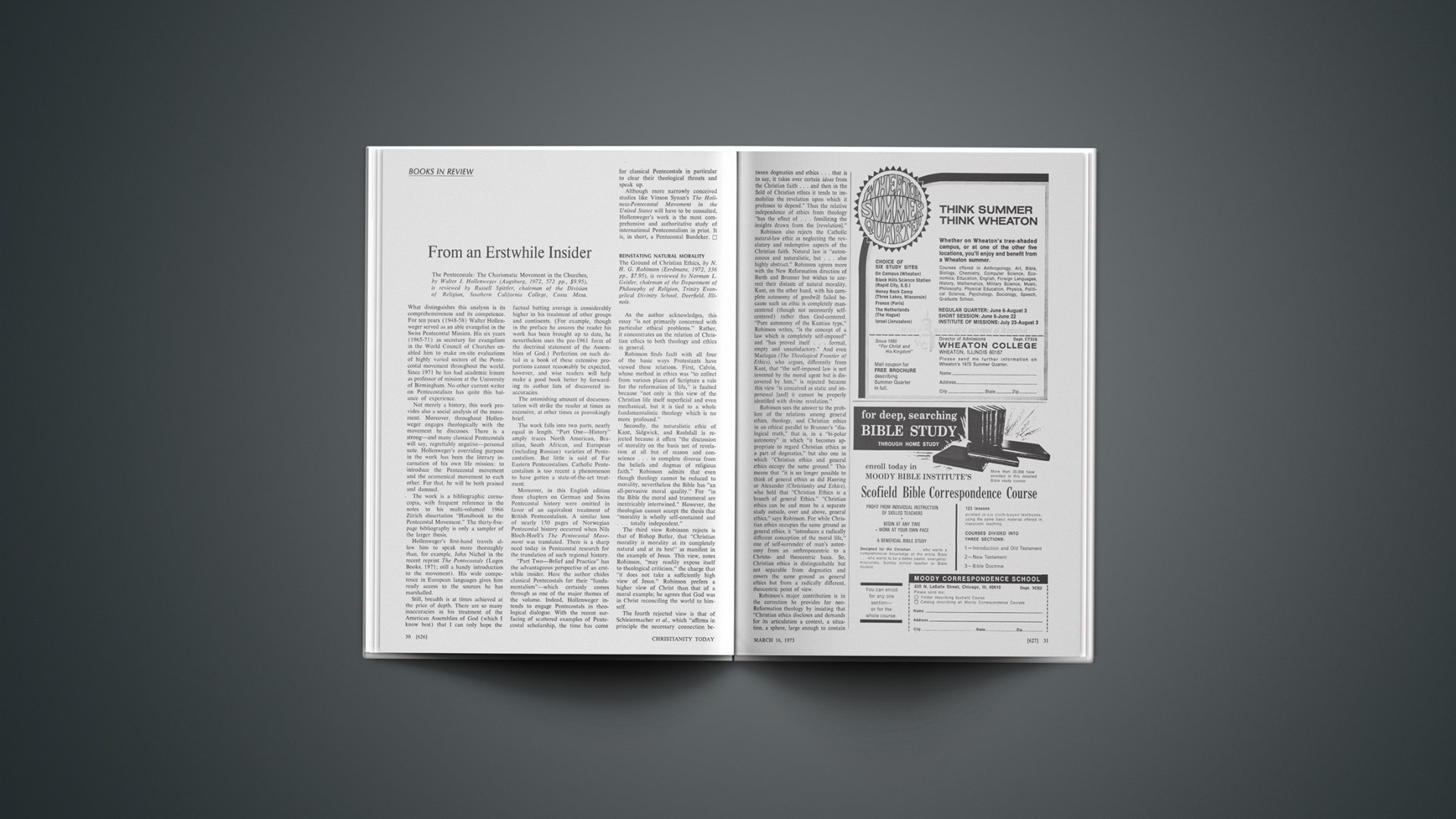The Pentecostals: The Charismatic Movement in the Churches, by Walter J. Hollenweger (Augsburg, 1972, 572 pp., $9.95), is reviewed by Russell Spittler, chairman of the Division of Religion, Southern California College, Costa Mesa.
What distinguishes this analysis is its comprehensiveness and its competence. For ten years (1948–58) Walter Hollenweger served as an able evangelist in the Swiss Pentecostal Mission. His six years (1965–71) as secretary for evangelism in the World Council of Churches enabled him to make on-site evaluations of highly varied sectors of the Pentecostal movement throughout the world. Since 1971 he has had academic leisure as professor of mission at the University of Birmingham. No other current writer on Pentecostalism has quite this balance of experience.
Not merely a history, this work provides also a social analysis of the movement. Moreover, throughout Hollenweger engages theologically with the movement he discusses. There is a strong—and many classical Pentecostals will say, regrettably negative—personal note. Hollenweger’s overriding purpose in the work has been the literary incarnation of his own life mission: to introduce the Pentecostal movement and the ecumenical movement to each other. For that, he will be both praised and damned.
The work is a bibliographic cornucopia, with frequent reference in the notes to his multi-volumed 1966 Zürich dissertation “Handbook to the Pentecostal Movement.” The thirty-five-page bibliography is only a sampler of the larger thesis.
Hollenweger’s first-hand travels allow him to speak more thoroughly than, for example, John Nichol in the recent reprint The Pentecostals (Logos Books, 1971; still a handy introduction to the movement). His wide competence in European languages gives him ready access to the sources he has marshalled.
Still, breadth is at times achieved at the price of depth. There are so many inaccuracies in his treatment of the American Assemblies of God (which I know best) that I can only hope the factual batting average is considerably higher in his treatment of other groups and continents. (For example, though in the preface he assures the reader his work has been brought up to date, he nevertheless uses the pre-1961 form of the doctrinal statement of the Assemblies of God.) Perfection on such detail in a book of these extensive proportions cannot reasonably be expected, however, and wise readers will help make a good book better by forwarding its author lists of discovered inaccuracies.
The astonishing amount of documentation will strike the reader at times as excessive, at other times as provokingly brief.
The work falls into two parts, nearly equal in length. “Part One—History” amply traces North American, Brazilian, South African, and European (including Russian) varieties of Pentecostalism. But little is said of Far Eastern Pentecostalism. Catholic Pentecostalism is too recent a phenomenon to have gotten a state-of-the-art treatment.
Moreover, in this English edition three chapters on German and Swiss Pentecostal history were omitted in favor of an equivalent treatment of British Pentecostalism. A similar loss of nearly 150 pages of Norwegian Pentecostal history occurred when Nils Bloch-Hoell’s The Pentecostal Movement was translated. There is a sharp need today in Pentecostal research for the translation of such regional history.
“Part Two—Belief and Practice” has the advantageous perspective of an erstwhile insider. Here the author chides classical Pentecostals for their “fundamentalism”—which certainly comes through as one of the major themes of the volume. Indeed, Hollenweger intends to engage Pentecostals in theological dialogue. With the recent surfacing of scattered examples of Pentecostal scholarship, the time has come for classical Pentecostals in particular to clear their theological throats and speak up.
Although more narrowly conceived studies like Vinson Synan’s The Holiness-Pentecostal Movement in the United States will have to be consulted, Hollenweger’s work is the most comprehensive and authoritative study of international Pentecostalism in print. It is, in short, a Pentecostal Baedeker.










